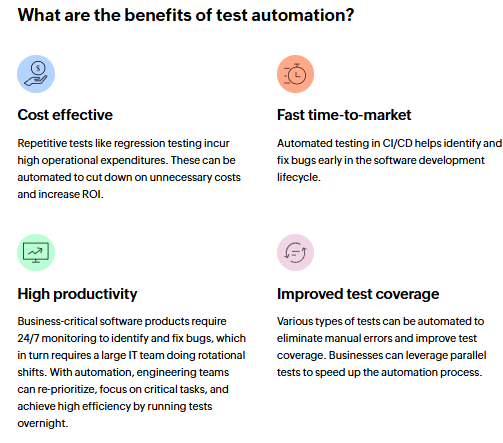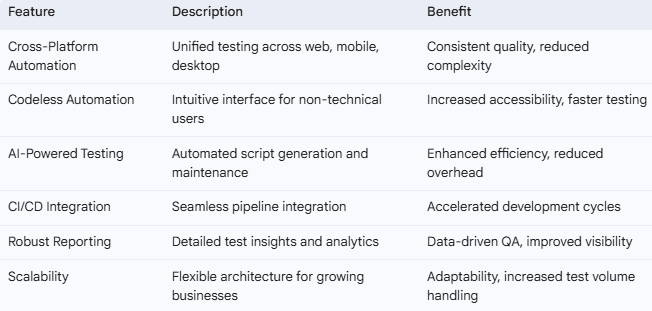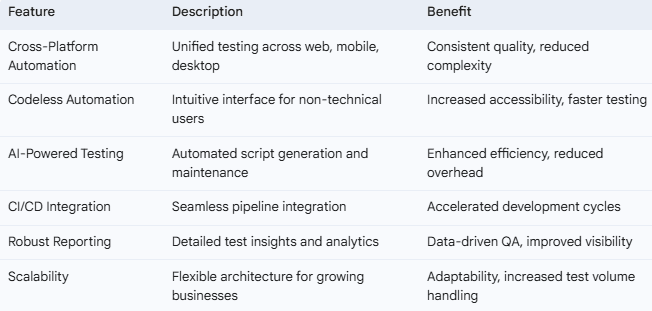
Users expect seamless and consistent experiences across all platforms and devices. Any discrepancies or bugs can lead to user frustration, negative reviews, and ultimately, lost revenue. From web browsers and mobile operating systems to IoT devices and smart appliances, businesses must ensure their software works seamlessly across a diverse ecosystem. This complexity presents a significant challenge for quality assurance (QA) teams, who are tasked with testing applications across a multitude of environments. As reported by Business Insider, "The device fragmentation is a QA nightmare," underscoring the growing need for unified testing solutions.
Zoho QEngine is a comprehensive test automation platform designed to address the challenges of cross-platform testing. It provides a unified solution for automating tests across web, mobile, and desktop applications, enabling businesses to ensure consistent quality and deliver seamless user experiences. With its codeless automation capabilities, AI-powered features, and integration with CI/CD pipelines, QEngine empowers QA teams to streamline their workflows and accelerate development cycles.

Challenges of Traditional Test Automation
Platform-Specific Testing Silos
Traditional test automation often involves using separate tools and frameworks for each platform, creating testing silos and hindering collaboration. This fragmented approach leads to duplication of effort, increased complexity, and higher costs. For example, a QA team might use Selenium for web testing, Appium for mobile testing, and specialized tools for desktop applications. This requires specialized knowledge and expertise for each tool, increasing the learning curve and maintenance overhead.
The Inefficiency of Manual Testing
Manual testing, while essential for certain aspects of QA, is time-consuming, error-prone, and difficult to scale. As applications become more complex and the number of platforms increases, manual testing becomes increasingly impractical. This leads to longer testing cycles, delayed releases, and higher costs. For example, manually testing a complex e-commerce application across multiple browsers and devices can take weeks, delaying critical feature releases.
The Rising Costs of Quality Assurance
The costs associated with QA are rising as businesses strive to deliver high-quality software across an increasing number of platforms. These costs include the expenses of purchasing and maintaining multiple testing tools, hiring and training specialized QA engineers, and managing the complexity of cross-platform testing. The rising costs of QA can significantly impact a business’s bottom line, making efficient and cost-effective testing solutions crucial.
The Impact on Time-to-Market
In today’s fast-paced market, time-to-market is a critical factor for success. Delays in testing and release can lead to lost revenue and competitive disadvantage. Traditional test automation approaches, with their inherent inefficiencies and complexities, can significantly impact time-to-market. For example, if a company is releasing a new feature, and testing takes too long, a competitor may get to market first, and gain a large market share.


The Need for Unified Test Automation Software
Ensuring Consistent Quality Across Platforms
Unified test automation software enables businesses to ensure consistent quality across all platforms and devices. By using a single tool to automate tests, QA teams can eliminate platform-specific variations and ensure that the application behaves as expected on all environments. This leads to a more consistent and reliable user experience.
Streamlining Test Automation Workflows
Unified test automation tools streamline test automation workflows by providing a centralized platform for managing tests, generating reports, and collaborating with team members. This reduces the complexity of testing and improves efficiency. For example, a single dashboard can show the results of tests run on multiple platforms, and allow for easy issue tracking.
Reducing Testing Overhead and Costs
By consolidating testing tools and automating repetitive tasks, unified test automation software reduces testing overhead and costs. This allows businesses to allocate resources more efficiently and focus on other critical areas of development. For example, by using codeless automation, less technical employees may be able to create tests, reducing the need for highly paid test engineers.
Enhancing Collaboration and Visibility
Unified test automation tools enhance collaboration and visibility by providing a shared platform for QA teams, developers, and project managers. This enables better communication, faster issue resolution, and improved project management. For example, a single system can allow developers to see the exact steps to reproduce an issue, and allow project managers to quickly view the progress of testing.
Accelerating Development Cycles
By automating tests and integrating with CI/CD pipelines, unified test automation software accelerates development cycles. This enables businesses to release new features and updates faster, improving time-to-market and enhancing competitiveness. For example, automated tests can be ran after every commit, and if they pass, allow for automated deployment to a production environment.
Features and Functionalities of the Zoho QEngine
Codeless Test Automation Capabilities
Zoho QEngine democratizes test automation by offering codeless capabilities, empowering non-technical users to create and execute automated tests. This is particularly beneficial for businesses seeking to reduce their reliance on specialized QA engineers and accelerate their testing processes. For instance, a business analyst with domain expertise can create automated tests using QEngine's intuitive interface, without needing to write a single line of code. This not only reduces the learning curve but also enhances collaboration between different teams, fostering a more agile and efficient QA environment.
Test Script Generation and Maintenance
Zoho QEngine leverages artificial intelligence (AI) to automate test script generation and maintenance, significantly reducing the effort required to create and update tests. Imagine a scenario where QEngine's AI analyzes application changes and automatically generates or updates test scripts, adapting to evolving requirements. This not only saves time but also enhances the accuracy and reliability of tests. Moreover, AI-powered self-healing capabilities enable QEngine to automatically fix broken tests, minimizing maintenance overhead and ensuring continuous test coverage.
Integration with CI/CD Pipelines
Zoho QEngine seamlessly integrates with continuous integration/continuous delivery (CI/CD) pipelines, enabling businesses to automate testing as part of their development workflow. This integration allows for rapid feedback and continuous quality assurance, accelerating development cycles and improving time-to-market. For example, QEngine can automatically trigger automated tests after each code commit, providing immediate feedback to developers on the impact of their changes.
Robust Reporting and Analytics
Zoho QEngine provides comprehensive reporting and analytics capabilities, enabling businesses to track test results, identify trends, and gain insights into their application’s quality. This includes detailed test reports, dashboards, and visualizations that provide a clear overview of test coverage, pass/fail rates, and performance metrics. These insights empower businesses to make data-driven decisions and continuously improve their QA processes.
Scalability and Flexibility
Zoho QEngine is designed to scale with businesses of all sizes, from startups to large enterprises. Its flexible architecture and cloud-based infrastructure ensure that businesses can adapt to changing requirements and handle increasing test volumes. Moreover, QEngine supports a wide range of platforms, devices, and browsers, providing the flexibility needed to test applications across diverse environments.


Strategic Implications
The ROI of Unified Test Automation
The ROI of unified test automation, powered by tools like Zoho QEngine, translates to substantial savings and enhanced efficiency. By minimizing platform-specific testing silos, reducing manual testing effort, and automating test script maintenance through AI, businesses can significantly reduce their QA expenditure. Moreover, the acceleration of development cycles and the assurance of consistent application quality lead to faster time-to-market and improved customer satisfaction, both of which are critical drivers of revenue growth.
Impact on Business Agility and Innovation
In a rapidly evolving digital landscape, business agility and innovation are crucial for survival. Zoho QEngine empowers businesses to adapt quickly to changing requirements and release new features with confidence. By automating testing and integrating with CI/CD pipelines, QEngine enables businesses to embrace agile development methodologies and foster a culture of continuous improvement.
The Future of AI-Driven QA
The future of quality assurance is inextricably linked to the advancement of artificial intelligence. Zoho QEngine is at the forefront of this evolution, incorporating AI-powered features to automate test script generation, maintenance, and self-healing. As AI continues to evolve, we can expect to see even more sophisticated QA tools that automate complex testing scenarios and provide real-time insights into application quality.
Conclusion
Zoho QEngine provides a powerful and unified solution for cross-platform test automation, empowering businesses to deliver high-quality software across a diverse range of platforms and devices. By embracing QEngine’s codeless automation, AI-powered features, and seamless integration with CI/CD pipelines, businesses can streamline their QA processes, reduce costs, and accelerate development cycles.


